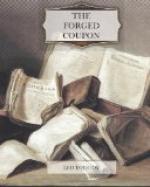Peter Nikolaevich had been an official in the Customs, and had gained eighteen thousand roubles during his service. About twelve years ago he quitted the service—not quite of his own accord: as a matter of fact he had been compelled to leave—and bought an estate from a young landowner who had dissipated his fortune. Peter Nikolaevich had married at an earlier period, while still an official in the Customs. His wife, who belonged to an old noble family, was an orphan, and was left without money. She was a tall, stoutish, good-looking woman. They had no children. Peter Nikolaevich had considerable practical talents and a strong will. He was the son of a Polish gentleman, and knew nothing about agriculture and land management; but when he acquired an estate of his own, he managed it so well that after fifteen years the waste piece of land, consisting of three hundred acres, became a model estate. All the buildings, from the dwelling-house to the corn stores and the shed for the fire engine were solidly built, had iron roofs, and were painted at the right time. In the tool house carts, ploughs, harrows, stood in perfect order, the harness was well cleaned and oiled. The horses were not very big, but all home-bred, grey, well fed, strong and devoid of blemish.
The threshing machine worked in a roofed barn, the forage was kept in a separate shed, and a paved drain was made from the stables. The cows were home-bred, not very large, but giving plenty of milk; fowls were also kept in the poultry yard, and the hens were of a special kind, laying a great quantity of eggs. In the orchard the fruit trees were well whitewashed and propped on poles to enable them to grow straight. Everything was looked after—solid, clean, and in perfect order. Peter Nikolaevich rejoiced in the perfect condition of his estate, and was proud to have achieved it—not by oppressing the peasants, but, on the contrary, by the extreme fairness of his dealings with them.
Among the nobles of his province he belonged to the advanced party, and was more inclined to liberal than conservative views, always taking the side of the peasants against those who were still in favour of serfdom. “Treat them well, and they will be fair to you,” he used to say. Of course, he did not overlook any carelessness on the part of those who worked on his estate, and he urged them on to work if they were lazy; but then he gave them good lodging, with plenty of good food, paid their wages without any delay, and gave them drinks on days of festival.
Walking cautiously on the melting snow—for the time of the year was February—Peter Nikolaevich passed the stables, and made his way to the cottage where his workmen were lodged. It was still dark, the darker because of the dense fog; but the windows of the cottage were lighted. The men had already got up. His intention was to urge them to begin work. He had arranged that they should drive out to the forest and bring back the last supply of firewood he needed before spring.




